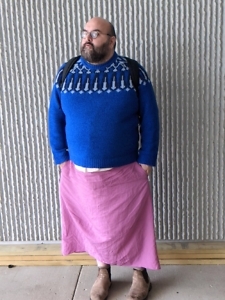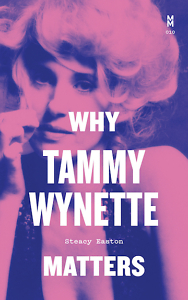Performing Womanhood
Why Tammy Wynette Matters places the singer’s work in a feminist context
Why Tammy Wynette Matters ventures beyond the usual narrative of Tammy Wynette as a tragic country star whose numerous marriages and early death have often defined her. In this slim yet rich book of criticism, Steacy Easton considers the singer’s “ambitious, transparent, and haunted work” in a feminist context, drawing out Wynette’s artistry and paying respect to her impact on country music.
 Country legends have a tendency to couple up. Wynette married George Jones. Tim McGraw married Faith Hill. June Carter and Johnny Cash’s love is legendary. These country couples represent something traditionally endemic to their genre and its many straight, God-loving fans: that marriage is a moral high ground, and it comes with distinct gender roles.
Country legends have a tendency to couple up. Wynette married George Jones. Tim McGraw married Faith Hill. June Carter and Johnny Cash’s love is legendary. These country couples represent something traditionally endemic to their genre and its many straight, God-loving fans: that marriage is a moral high ground, and it comes with distinct gender roles.
In country music, men are outlaws, breadwinners, and party animals. Women are sensitive, loving, and domestic. Wynette’s persona embodies that type of womanhood. Easton is nonbinary, and they credit their personal distance from heteronormative domesticity as the root of their fascination with Wynette’s relationship to it: “Country music’s consideration of the domestic is done in the context of an audience of people who belong to it, and so those who are outside its sphere are not allowed to be external critics of it.” Easton’s removal from the domestic brings this outsider perspective to the forefront. What we may take for granted about Wynette’s songs about “women at home” becomes a grounding focal point for Easton’s criticism.
Traditional femininity and preserving the domestic dream were core to Wynette’s persona. As a Southern woman from small-town Mississippi, she followed the well-etched path and married when she was 17. In her pre-fame years, she worked as a hairdresser — an archetypal “femme” occupation. She had three daughters and would have a fourth daughter in her marriage to George Jones. She kept entering into marriage, despite being with abusive men, and married five times.
History stops there in the story of Wynette’s life — the humble roots and five husbands are what we get. What makes Why Tammy Wynette Matters exceptional is that it considers how those experiences gave her work its power. “The dramatic irony of making great art about domestic roles while failing in them is central to understanding why she matters,” writes Easton. Wynette’s best songs like “D-I-V-O-R-C-E,” “Apartment No. 9,” and “I Don’t Want to Play House” depict lonely domestic scenes of women reflecting on crumbling marriages or their husbands’ extramarital affairs.
 Easton argues that Wynette’s lived experiences make her performances of these songs transcendent. Even an untrained ear can detect her “well for sadness” on “Stand by Your Man,” probably her best-known song. Easton’s reading of “Stand by Your Man” offers many layers. Wynette took hits from second-wave feminists over the song for promoting submissive ideals of marriage, and she performed it at a political rally for George Wallace — the massively racist longtime governor of Alabama. Easton reveals the not-so-flattering anecdotes and deeper truths about why “Stand by Your Man” matters.
Easton argues that Wynette’s lived experiences make her performances of these songs transcendent. Even an untrained ear can detect her “well for sadness” on “Stand by Your Man,” probably her best-known song. Easton’s reading of “Stand by Your Man” offers many layers. Wynette took hits from second-wave feminists over the song for promoting submissive ideals of marriage, and she performed it at a political rally for George Wallace — the massively racist longtime governor of Alabama. Easton reveals the not-so-flattering anecdotes and deeper truths about why “Stand by Your Man” matters.
Despite her relatability, Wynette was not your average woman or wife. Her rigorous tour schedule and the 33 albums she recorded are evidence of that. She asked for divorces. She made the money. So, why did she perform domesticity and gender roles with fervor? Easton wonders whether Wynette’s attachment to her persona as a wife was due to feeling confined by the role, yet not seeing a way out: “One of the central themes of Wynette’s career was how ‘it’s hard to be a woman,’ and by extension it’s hard to avoid the traps that exist in performing womanhood.” One trap was the way the music industry perceived her. Critics and Music Row serially downplayed her role in her own art. Because Wynette didn’t write her songs, they would credit others (men) with the significance of her work.
Easton understands Wynette’s performance of gender as a “fracturing of the self.” Wynette held onto her domestic image, but at the same time she was a bona fide star. “This move between diva and mother, between arch performer and ordinary domestic, was the dialectic that marked Wynette’s life,” writes Easton. She had immense talent — it’s hard to find the words to explain the cutting power of her voice. What should also be remembered is the way she navigated two spheres, the public and the private, and the dimensions this brought to her music.
Easton acknowledges that Wynette is underplayed today, writing that Wynette’s “skills and talents have slipped under public consciousness.” Luckily the author is here to revive her memory and give her work the critical reading it deserves. Easton is “deeply committed to Wynette as a performer and writer.” They approach their subject with curiosity, generosity, and love. Loving Wynette feels important when writing about her. Real love celebrates nuance. When studying Wynette, nuance feels like the necessary treatment.

Jacqueline Zeisloft is a writer and editor whose work has appeared in Nashville Scene and Women’s Review of Books. She holds a B.A. in English literature from Belmont University. She lives in Brooklyn, New York.


